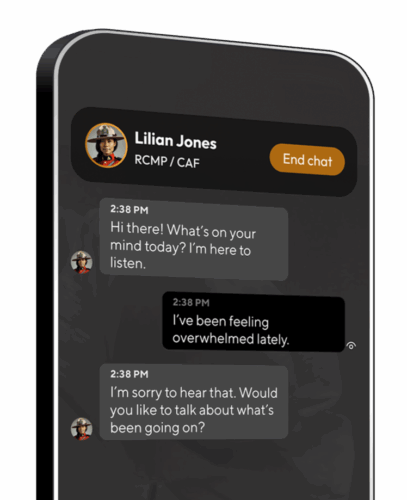
We’re not providing mental health support services,” said TryCycle Data Systems founder John MacBeth. “We’re providing human connection,” he told a gathering of Legionnaires in August 2024.
In an increasingly digital world, authentic human connection has become a rarity. And just as modernity may hinder people’s sense of community, it may also be the anecdote needed, says MacBeth, for veterans to reach their optimal selves.
The evidence is in the Burns Way, an online peer-support tool for veterans developed by TryCycle Data and endorsed by the RCL, which since its launch has facilitated invaluable connections.
MacBeth’s vision was fully realized on Jan. 15, 2025, when the Burns Way opened its proverbial doors to veterans seeking comfort, guidance and camaraderie, as well as those best placed to offer it.
Its name honours the legacy of retired private Earl Burns Sr., who, on Sept. 4, 2022, died protecting his family and community amid a stabbing spree at Saskatchewan’s James Smith Cree Nation.
“We want individuals to build confidence in getting help for themselves through speaking to someone who’s worn their boots,” explained project lead Cameron MacLeod, “whether it’s RCMP, Canadian Armed Forces or a family member.”
Users, whether via the mobile app or on the Burns Way website, can hone their search for advocates most closely aligned with their own lived experiences.
“We want them to find the peer advocate who meets their needs, rather than just a peer advocate, explained MacLeod.
More than 200 applicants volunteered their time and services when the recruitment campaign began in November 2024, at least 50 of whom were initially selected to undertake standard and mental health first aid training prior to connecting with a fellow veteran.
The not-for-profit Burns Way, which steers clear of automated robots and artificial intelligence, or AI, that many public-facing parts of organizations currently use, recognizes the importance of anonymity and security as two vital factors that can often influence a veteran’s willingness to seek support. Thus, in delivering free, 24-hour assistance, the online portal requires neither an email address nor login details. Additionally, those choosing to create personalized profiles do so with a guarantee that no one else can access their information.
Only that which is voluntarily divulged to a peer advocate is known about an individual user. Once that conversation ends, the record is permanently deleted.
The fact that its users can remain anonymous addresses a major concern of many former service personnel. The Burns Way also doesn’t fit the traditional mould of mental health services. It’s “not a crisis line,” MacLeod asserted. “Obviously, [under such circumstances], the peer advocate will respond. They’d then try to reduce the person’s anxiety, referring them to more formal support if intervention is required.
“[Our program] is not therapy, even if it might occasionally be therapeutic.”
Despite this, every peer is certified by Opening Minds, an affiliate of the Mental Health Commission of Canada, each having completed its “Mental Health First Aid—Veteran Community” course.
Elsewhere, MacLeod noted, the question of funding looms large. “From the outset, TryCycle Data Systems has supported the entire thing. They’ve invested more than three quarters of a million dollars into the Burns Way in cash and in-kind. So, we’re really looking to getting the program funded in a way that makes it sustainable.”
In June 2023, a proposal was submitted to VAC requesting $9.5 million annually for three years. To date, no formal commitment has been made.
“We know government is bound by rules, but they’ve been generous with their time and have worked with us to try and find a way of making this happen—we’ll have to wait and see.”
Following the success of the Talking Stick app, a previous TryCycle initiative that matches Indigenous Peoples in Saskatchewan with fellow Indigenous advocates, Macleod is hopeful the Burns Way will similarly flourish.
Regardless, one aspect of its mandate will remain: cultivating safe and secure support for Canadian veterans and their families.
“If you know of someone who’s struggling out there,” said MacLeod. “Tell them about us. Let them know someone is ready to listen.
Advertisement






















